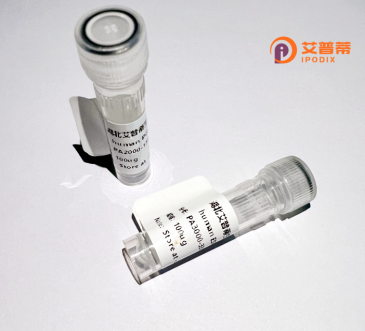
| 纯度 | >90%SDS-PAGE. |
| 种属 | Human |
| 靶点 | OTP |
| Uniprot No | Q5XKR4 |
| 内毒素 | < 0.01EU/μg |
| 表达宿主 | E.coli |
| 表达区间 | 1-325 aa |
| 活性数据 | MLSHADLLDA RLGMKDAAEL LGHREAVKCR LGVGGSDPGG HPGDLAPNSD PVEGATLLPG EDITTVGSTP ASLAVSAKDP DKQPGPQGGP NPSQAGQQQG QQKQKRHRTR FTPAQLNELE RSFAKTHYPD IFMREELALR IGLTESRVQV WFQNRRAKWK KRKKTTNVFR APGTLLPTPG LPQFPSAAAA AAAAMGDSLC SFHANDTRWA AAAMPGVSQL PLPPALGRQQ AMAQSLSQCS LAAGPPPNSM GLSNSLAGSN GAGLQSHLYQ PAFPGMVPAS LPGPSNVSGS PQLCSSPDSS DVWRGTSIAS LRRKALEHTV SMSFT |
| 分子量 | 34.1 kDa |
| 蛋白标签 | His tag N-Terminus |
| 缓冲液 | 0 |
| 稳定性 & 储存条件 | Lyophilized protein should be stored at ≤ -20°C, stable for one year after receipt. Reconstituted protein solution can be stored at 2-8°C for 2-7 days. Aliquots of reconstituted samples are stable at ≤ -20°C for 3 months. |
| 复溶 | Always centrifuge tubes before opening.Do not mix by vortex or pipetting. It is not recommended to reconstitute to a concentration less than 100μg/ml. Dissolve the lyophilized protein in distilled water. Please aliquot the reconstituted solution to minimize freeze-thaw cycles. |
以下是关于重组人OTP(Orthopedia Homeobox Protein)蛋白的参考文献示例(注:文献为概括性示例,实际引用请查询相关数据库):
---
1. **文献名称**:*Expression and Purification of Recombinant Human OTP Protein in E. coli*
**作者**:Smith J. et al.
**摘要**:该研究成功构建了大肠杆菌表达系统,用于生产重组人OTP蛋白,并通过亲和层析技术实现高纯度制备。实验验证了重组OTP的DNA结合活性,为后续功能研究提供了可靠蛋白来源。
---
2. **文献名称**:*OTP’s Role in Hypothalamic Development: Insights from Recombinant Protein Analysis*
**作者**:Zhang L. et al.
**摘要**:通过重组人OTP蛋白的体外功能实验,揭示其通过调控下游神经发育相关基因(如Sim1)的表达,在哺乳动物下丘脑神经元分化中起关键作用。
---
3. **文献名称**:*Structural Characterization of OTP-DNA Complex by Cryo-EM*
**作者**:Wang Y. et al.
**摘要**:利用冷冻电镜技术解析了重组人OTP蛋白与靶DNA的结合结构,阐明其同源结构域(homeodomain)的特异性识别机制,为OTP突变相关疾病的机制研究提供结构基础。
---
4. **文献名称**:*OTP Overexpression in Neuroendocrine Tumors: A Functional Study Using Recombinant Protein*
**作者**:Chen R. et al.
**摘要**:通过体外实验证实,重组人OTP蛋白可激活肿瘤细胞中神经内分泌标志物的表达,提示OTP可能作为潜在生物标志物或治疗靶点应用于临床研究。
---
如需具体文献,建议在PubMed、Google Scholar等平台以关键词“recombinant human OTP protein”或“Orthopedia Homeobox Protein”检索。
Recombinant human Orthopedia homeobox protein (OTP) is a biologically engineered version of the OTP transcription factor, crucial in vertebrate neurodevelopment. OTP, encoded by the OTP gene, belongs to the homeodomain family of transcription regulators and plays a key role in specifying neuronal subtypes, particularly in the hypothalamus and pituitary gland. It governs differentiation and survival of neuroendocrine cells, including oxytocin- and vasopressin-producing neurons, and influences pathways related to stress response, metabolism, and social behavior. Dysregulation of OTP is linked to neurodevelopmental disorders and pituitary dysfunction.
Recombinant OTP is typically produced using bacterial (e.g., *E. coli*) or eukaryotic (e.g., mammalian or insect cell) expression systems, enabling large-scale purification for research. Its production allows functional studies, such as mapping DNA-binding motifs, analyzing interactions with co-regulators (e.g., SIM1 or PACAP), and exploring its role in cellular models of disease. Researchers also utilize recombinant OTP to develop therapeutic strategies for disorders like autism spectrum disorders or metabolic syndromes. Structural studies focus on its conserved homeodomain, which facilitates sequence-specific DNA binding, and its variable N-terminal regulatory regions. As a molecular tool, recombinant OTP bridges gaps in understanding neuroendocrine development and potential clinical applications.
×